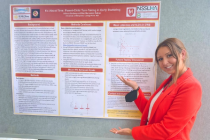Language Acquisition
The Language Science Center awarded Ama Arhin an undergraduate research fellowship for spring 2023.
Computational models of language acquisition: Lessons from humans for machines and from machines for humans
The Language Science Center awarded two undergraduate research fellowships in summer 2022. These fellowships are funded in part from the generous contributions of donors on Giving Day.
Infants Learn From The Messy Dynamics of Their Natural Communicative Environments
Although we will continue to offer a Zoom option for LSLT for now, we strongly encourage you to attend in person! The talk is only part of the point of LSLT: it's a good opportunity to meet and chat with students and faculty in other departments. And we've now reinstated the classic LSLT sandwich line!
Zoom link: https://go.umd.edu/lslt-zoom
Language Knowledge Influences Parsing Strategies in 5-year-old Children
Zoom link: https://umd.zoom.us/my/jessicamendes
Asymmetries in presupposition projection: processing and acquisition
Abstract: Presuppositions triggered in the right arguments of binary connectives such as if and or are sometimes inherited wholesale by the sentence, as illustrated in (1). Sometimes, however, the sentence as a whole presupposes something weaker, e.g. (2).
Literacy is everywhere: Identifying opportunities to support children’s language and literacy within everyday routines
Zoom: https://go.umd.edu/lslt-zoom
Spectral contrasts produced by children with cochlear implants: Investigating the impact of signal degradation on speech acquisition








